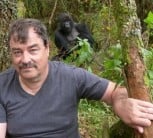14 November 2014 by Louise de Bruin
An acclaimed international study looking into new reasons behind the dwindling numbers of cheetah in southern Africa had its inception at the University of Pretoria (UP). Before this study, it was commonly thought that cheetah numbers were declining partly as a result of larger predators stealing their prey, thus lessening the availability of food and forcing them to expend more energy in search of food. However, a recent study offers new insight into why cheetahs may become vulnerable with regard to their energy levels, which could affect their general health and well-being and result in their ultimate decline.
The conceptual ideas for this study developed several years ago when Dr Michael Scantlebury, then a postdoctoral fellow, was studying mole rats in collaboration with Prof Nigel Bennett, holder of the Austin Roberts Chair of Mammalogy. From their innovative research using doubly labelled water (DLW) to determine daily energy expenditure (DEE) on caste differentiation in mole rats, which was incidentally published in Nature, they thought it a good idea to extend the study to a more enigmatic species like the cheetah to generate greater exposure for their ground-breaking findings.
The DLW method is a technique in terms of which so-called ‘heavy’ water is injected into an animal to evaluate its water loss through urination, defecation and perspiration in order to determine the amount of energy expended. During such activities, animals also produce carbon dioxide (CO₂). By analysing the production of CO₂, energy expenditure can be determined. Scantlebury found that even if 25% of a cheetah’s food is lost through kleptoparasitism (food stolen by larger predators), the effects are not devastatingly detrimental, as assumed previously. What proves to have a far greater negative effect on the well-being of cheetahs is the distance they have to walk in search of food.
The study, which evolved into an international collaboration, studied the energetics of 19 free-roaming cheetahs (fourteen in the Kgalagadi Transfrontier Park, and five in the Karongwe Private Reserve near Hoedspruit). The results showed that, contrary to common wisdom, the energy output during a high-speed cheetah chase after prey is not excessive. Rather, it seems that the energy they use to locate food far outweighs that used during a chase. The authors of the paper suggest that human activity, rather than competition with larger carnivores, is the predominant reason for the decline of cheetahs. Cheetahs have a nomadic lifestyle with a vast range. Consequently the number of fences erected on farms and placed around reserves is imposes a tremendous restriction on their hunting opportunities, with a ripple effect on their energy budgets. Bennett says, ’Cheetahs, like all carnivores, tread an energetic tightrope and low energy has several negative consequences, which may affect the immune system, reproductive abilities and metabolism.’
An international study of this kind has many benefits, Bennett notes. Broad collaboration implies that more resources can be invested in the study, and input of experts from multidisciplinary fields can be obtained. A previous graduate and extraordinary professor at UP, Dr Gus Mills, and his wife Margie were instrumental in the fieldwork for this study done in the Kalahari. They were involved in a six-year intensive study of Kalahari cheetahs, and so the energy research was piggy-backed on their work. They could follow Kalahari cheetahs and collect important faecal samples, and also provide invaluable background data that was used to interpret the results of the energetics study.
According to Bennett, there is great promise in furthering the study and adapting the findings. Because this initial study was done in the extreme weather setting of the Kalahari, Bennett mentioned the value of monitoring cheetahs in other areas of their savannah habitat, such as parts of the Kruger National Park. It would also be interesting to look at areas with a higher density of prey. However, the importance of this study is not just that it has offered new insight into a species whose declining numbers have dwindled to less than 10 000. What this study also shows is the importance of tackling all angles of a situation. While man’s intention may have been good when designating and cordoning off areas for wildlife, the reality seems that when the environment is modified too drastically, adverse effects and unintended consequences often result.
Prof Nigel Bennett
November 14, 2014

 Story
Story
This edition is curated around the concept of One Health, in which the University of Pretoria plays a leading role globally, and is based on our research expertise in the various disciplines across healthcare for people, the environment and animals.
 Story
Story
A new study by researchers at the University of Pretoria (UP) and the University of Adelaide in Australia has revealed the real function of the giraffe’s long legs ¬– to reduce blood pressure.
 Infographic
Infographic
This infographic explains the long and short of a giraffe's legs. By having long legs, the giraffe is able to reduce the pressure it needs to get blood to its brain, thereby saving the animal energy.
Copyright © University of Pretoria 2025. All rights reserved.
Get Social With Us
Download the UP Mobile App